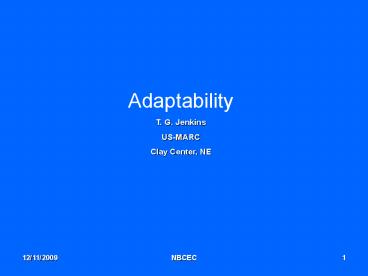Adaptability - PowerPoint PPT Presentation
1 / 18
Title:
Adaptability
Description:
Speakers invited to provide background on 'adaptation' from non ... Graze average pasture March 1 through weaning. Graze residual November 1 through March 1 ... – PowerPoint PPT presentation
Number of Views:3221
Avg rating:3.0/5.0
Title: Adaptability
1
Adaptability T. G. Jenkins US-MARC Clay Center, NE
2
Topic NBCEC Brown Bagger series winter
2004 Workshop on Adaptability March 5-6,
2004 Noble Foundation, Ardmore
OK Participants Speakers invited to provide
background on adaptation from
non-animal production disciplines. J. Derr
F. Provenza R. Browning, Jr. Producers
representing diverse cattle production
environment Southeast, Midwest Northern
Plains, Northwest Southwest
3
Working Discussion Points Adaptability is a
concept describing the reproductive success of
favored individuals in a defined
environment Phenotypic Genetic Adaptability
is an ERT ? Suite of indicator traits that
differ or receive different weightings across
herds/regions Genetic evaluations conducted on
indicator traits within herd/region
4
Adaptability enhanced through improving animals
fitness for a defined production environment
Forage selectivity
Parasite tolerance
Endophyte tolerance
Heat tolerance
Water requirements
Nutrient requirements
fitness could be considered ability to express
fecundity potential
5
Simulate the Effect of Enhancing Productivity in
Cow Herd by Improving Economically Relevant
Trait Adaptability
6
Mean Potentials Birth weight Mature Weight Peak
milk yield lb lb
lb
73 1384 23
7
Management program Desired inventory 150 pregnant
females January 1 Spring calving Fall weaning
(200 d) 60 d breeding season Graze average
pasture March 1 through weaning Graze residual
November 1 through March 1 15 lb/cow/day of
hay 1 lb/cow/day protein supplement Cull all
open cows every fall All cows remove end of their
10th years of age All calves sold at weaning
(replacement heifers excluded) 114.5/hwt
average price
8
Four Scenarios Identification Feed program
Replacement rate Fitness
LFert1030 as described 30/year
- Management change FedLFert1030
extend to breeding 30/year -
LFert1037 as described 37/year
- Genetic change HFert1030 as described
30/year Unable to meet target of
150 pregnant females January 1 inventory
9
(No Transcript)
10
Cows Over 5 Years of Age Calved Every
Year LFert1030 FedLFert1030 LFert1037
HFert1030 36.0
38.2 35.0
45.8
LFERT1030 normal practice FedLFert1030 increased
energy supplementation prior to
breeding LFert1037 increase number of replacement
heifers each year HFert1030 adapted females
11
(No Transcript)
12
Mean Calving Distribution Day of
calving LFert1030 FedLFert1030
LFert1037 HFert1030 1-21 d
48 49 46 58 22-42 d 21 22 21 20
43-62 d 15 18 19 13 gt62 d
16 11 14 9
LFERT1030 normal practice FedLFert1030 increased
energy supplementation prior to
breeding LFert1037 increase number of replacement
heifers each year HFert1030 adapted females
13
Comparison of Predicted Five Year Productivity
Means LFert1030 FedLFert1030
LFert1037 HFert1030 sold lb sold
sold lb sold sold lb
sold sold lb sold 96 42090
6 3300 9
3976 14 7683 As deviation
from LFERT1030
LFERT1030 normal practice FedLFert1030 increased
energy supplementation prior to
breeding LFert1037 increase number of replacement
heifers each year HFert1030 adapted females
14
(No Transcript)
15
Comparison of Predicted Five Year Average Revenue
and Feed Cost LFert1030
FedLFert1030 LFert1037 HFert1030 Revenue
48090 3780 4552
8797 Feed Costs 11286
5503 1839 1608 R-FC
36804 (1649)
2713 7189 As deviation
from LFERT1030
LFERT1030 normal practice FedLFert1030 increased
energy supplementation prior to
breeding LFert1037 increase number of replacement
heifers each year HFert1030 adapted females
16
Workshop on Adaptability
17
Desired End Points White paper providing
definitive statement about adaptability for
beef production phenotypic vs.
genetic Identification of potential indicator
traits Potential structure for genetic
evaluation with defined environment for
those involved in the production of beef
cattle
18
Kansas City MO October 29-30, 2004 Sponsored by
BIF































